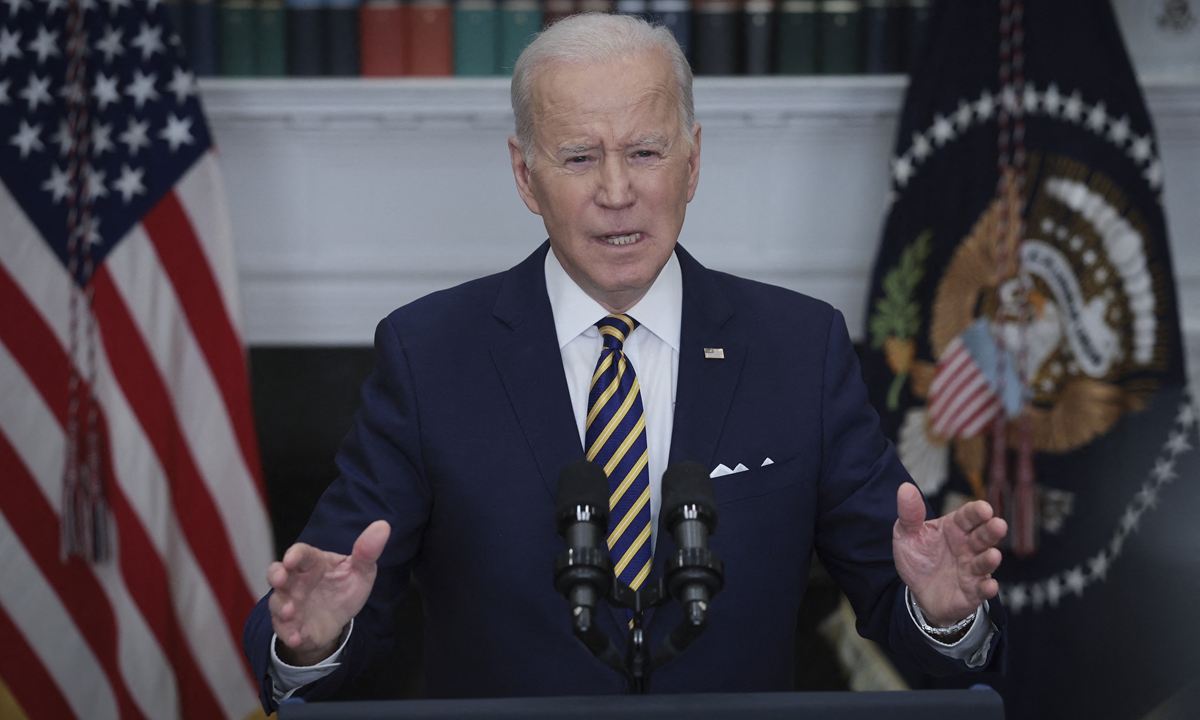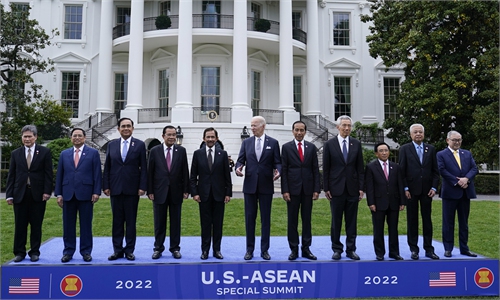US envoy reveals Biden's true purpose of targeting China by Asia visit, but experts say 'countries don't easily buy it'

US President Joe Biden announced a full ban on imports of Russian oil and energy products on March 8, 2022. Photo: AFP
Just days before US President Joe Biden's Asia visit, his envoy to Japan admitted that Biden's Asia visit targets China and, he claimed, would be a "wake-up call" to China, while analysts said it exposes Biden's true purpose of the visit is to form a US-led clique in Northeast Asia to encircle China rather than for the sake of peace and development of the region.
The Asia visit was an important part of the Biden administration's efforts in pushing forward its "Indo-Pacific Strategy" across the Asia-Pacific region to attempt to close in on China militarily, politically and economically. But Chinese analysts said that after his try to tout his economic strategy of the Indo-Pacific Economic Framework (IPEF) was snubbed last week by ASEAN members in Washington, his try in Northeast Asia will only be another fruitless effort.
Ahead of Biden's visit to South Korea and Japan starting Friday, US Ambassador to Japan Rahm Emanuel told Nippon TV that China is not envisioned to participate in the US-initiated IPEF, and the new framework is not about low cost and efficiency which are China's strength, but about sustainability and stability.
He said Biden's visit to Japan will show the strength of the bilateral alliance to China. "It's a wake-up call to China that America is the permanent Pacific presence and power," he said.
The White House said earlier that Biden's visit from May 20-24 is aimed at further deepening ties between governments, economies, and people, and the trip will advance the Biden administration's "rock-solid commitment" to a "free and open Indo-Pacific" and to US treaty alliances with South Korea and Japan.
Emanuel's remarks indicated Biden's Asia visit will by no means a peaceful but rather a provocative visit, eyeing pushing forward its encirclement of China through cobbling together an economic clique of IPEF after building the security and political cliques of Australia-UK-US (AUKUS) trilateral security partnership and the US-Japan-Australia-India (Quad) dialogue, Lü Chao, an expert on the Korean Peninsula issue at the Liaoning Academy of Social Sciences, told the Global Times on Tuesday.
Last week, Japanese envoy to the US Koji Tomita said that Biden's IPEF is likely to be formally launched in Japan during Biden's visit, Kyodo News reported.
US attempts have been exposed at last week's US-ASEAN summit, during which the Biden administration touted IPEF to ASEAN members but was not received well, as experts said the IPEF lacks of substance and some of the standards may be too high for developing economies and more importantly, it's a geo-strategic framework, rather than a purely economic framework, with the aim to decouple from China.
Emanuel's comments further proved that it was an exclusive club that excludes China, Da Zhigang, director of the Institute of Northeast Asian Studies at Heilongjiang Provincial Academy of Social Sciences, told the Global Times.
The IPEF was not mature and, with political polarization, sharp partisan conflicts, and mounting pressure of midterm elections for the Biden administration, it is no easy job to get the IPEF passed in Congress and implemented, Da said.
Southeast Asian countries' lack of interest in it has proven that Asia-Pacific countries will not buy the US' new geopolitical clique cloaked in economic topics, Lü said.
One of Biden's main purposes of this visit is to persuade South Korea to be firmer in its alliance with the US and Japan. But Chinese analysts said South Korea will not take a stand with the US to contain China as Monday's candid talk between Chinese and South Korean foreign ministers revealed that bilateral cooperation in the Korean Peninsula, economy and safeguarding global supply chain was highly recognized by the two countries.
Chinese State Councilor and Foreign Minister Wang Yi urged China and South Korea to "guard against the risks of the new Cold War and oppose camp confrontation" while meeting with Park Jin, the new foreign minister of South Korea, via video link on Monday.
"Standing at a new starting point, we should grasp the right direction and create another 30 years of greater development of China-South Korea relations," Wang said.
Both sides should proceed from their respective and common interests, oppose the negative tendency of "decoupling" and "cutting off chains," and maintain the stability and smoothness of the global industrial chain and supply chain, Wang said.
Park said South Korea hopes to take the 30th anniversary of the establishment of diplomatic relations between the two countries as a new starting point to maintain high-level exchanges, deepen economic and trade cooperation, promote people-to-people exchanges, and push bilateral relations to a new level.
Lü said that Park, who is deemed as a pro-US politician, has shown willingness to deepen relations with China and both China and South Korea highly recognize the significance of bilateral cooperation in the future.
In 2020 and 2021, bilateral trade between China and South Korea hit new highs and many South Korean companies are optimistic about China's economic prospects and market potential.
South Korean chipmaker SK Hynix started to build a new fab in Dalian, Northeast China's Liaoning Province, on Monday.
The talk, ahead of Biden's visit, showed that South Korea will not join the US to contain China, Lü said.
South Korean President Yoon Suk-yeol indicated his new government will take part in the IPEF, Bloomberg reported on Monday.
Da said even if South Korea joined in the IPEF, it aims at using the platform to explore more economic presence in Southeast Asia.



